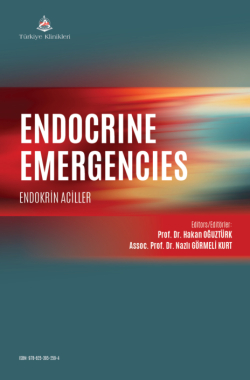Alcholic Ketoacidosis
Ayşe Sümeyye ARIa , Gülhan KURTOĞLU ÇELİKa
aAnkara Bilkent City Hospital, Clinic of Emergency Medicine, Ankara, Türkiye
Arı AS, Kurtoğlu Çelik G. Alcholic ketoacidosis. In: Oğuztürk H, Görmeli Kurt N, eds. Endocrine Emergencies. 1st ed. Ankara: Türkiye Klinikleri; 2024. p.31-5.
ABSTRACT
Alcoholic ketoacidosis (AKA) is a syndrome observed in individuals who engage in excessive alcohol consumption and have inadequate nutrition, typically triggered by the abrupt cessation of alcohol intake. Patients with AKA are both nutritionally deficient due to reduced oral intake and dehydrated owing to the diuretic effect of alcohol. When glycogen stores are depleted, metabolism shifts towards the breakdown of fat and protein. Additionally, reduced oral intake leads to decreased insulin levels and a significant increase in lipolysis. Insulin deficiency further enhances hormone-sensitive lipase activity, promoting the conversion of ethanol to acetaldehyde and acetyl-CoA. In each acetaldehyde-toacetyl-CoA conversion, NAD+ is transformed into NADH. The shift in the NAD+/NADH ratio towards NADH causes hypoglycemia, increased lactate, and elevated beta-hydroxybutyric acid. Patients typically present with nonspecific symptoms such as nausea, vomiting, and abdominal pain. Metabolic acidosis may occur, necessitating an increased respiratory rate and Kussmaul breathing for compensation.Blood ethanol and glucose levels may be normal or decreased due to inadequate oral intake. Malnutrition may lead to hypokalemia and hypomagnesemia. Evaluation for Wernicke’s encephalopathy (encephalopathy, ataxia, ophthalmoplegia) is crucial. AKA is primarily diagnosed clinically, with the exclusion of other causes of metabolic acidosis, most notably diabetic ketoacidosis. Fluid resuscitation is paramount in treatment, and solutions containing dextrose, thiamine, and early transition to oral intake are crucial. Correction of identified electrolyte abnormalities is essential for comprehensive management.
Keywords: Ethanol; metabolic acidosis; diyabetic ketoacidosis
Kaynak Göster
Referanslar
- Suzuki K, Tamai Y, Urade S, Ino K, Sugawara Y, Katayama N, Hoshino T. Alcoholic ketoacidosis that developed with a hypoglycemic attack after eating a high-fat meal. Acute Med Surg. 2013;1(2):109-114. [Crossref] [PubMed] [PMC]
- Noor NM, Basavaraju K, Sharpstone D. Alcoholic ketoacidosis: a case report and review of the literature. Oxf Med Case Reports. 2016;2016(3):31-3. [Crossref] [PubMed] [PMC]
- Ghimire P, Dhamoon AS. Ketoacidosis. [Updated 2023 Sep 25]. In: StatPearls [Internet]. Treasure Island (FL): StatPearls Publishing; 2023 Jan-. Available from: [Link]
- Howard RD, Bokhari SRA. Alcoholic Ketoacidosis. [Updated 2022 Sep 6]. In: StatPearls [Internet]. Treasure Island (FL): StatPearls Publishing; 2024 Jan-. Available from: [Link]
- Dillon ES, Dyer WW, Smelo LS. Ketone Acidosis in Nondiabetic Adults. Med Clin North Am. 1940;24(6):1813-22. [Crossref]
- Jenkins DW, Eckle RE, Craig JW. Alcoholic ketoacidosis. JAMA. 1971;217(2):177-83. [Crossref] [PubMed]
- McGuire LC, Cruickshank AM, Munro PT. Alcoholic ketoacidosis. Emerg Med J. 2006;23(6):417-20. [Crossref] [PubMed] [PMC]
- Wrenn KD, Slovis CM, Minion GE, Rutkowski R. The syndrome of alcoholic ketoacidosis. Am J Med. 1991;91(2):119-28. [Crossref] [PubMed]
- Adler RA. Clinical review 33: Clinically important effects of alcohol on endocrine function. J Clin Endocrinol Metab. 1992;74(5):957-60. [Crossref] [PubMed]
- Palmiere C, Augsburger M. The postmortem diagnosis of alcoholic ketoacidosis. Alcohol Alcohol. 2014;49(3):271-81. [Crossref] [PubMed]
- Yanagawa Y, Sakamoto T, Okada Y. Six cases of sudden cardiac arrest in alcoholic ketoacidosis. Intern Med. 2008;47(2):113-7. [Crossref] [PubMed]
- Matsuzaki T, Shiraishi W, Iwanaga Y, Yamamoto A. Case of alcoholic ketoacidosis accompanied with severe hypoglycemia. J UOEH. 2015;37(1):43-7. [Crossref] [PubMed]
- Schelling JR, Howard RL, Winter SD, Linas SL. Increased osmolal gap in alcoholic ketoacidosis and lactic acidosis. Ann Intern Med. 1990;113(8):580-2. [Crossref] [PubMed]

